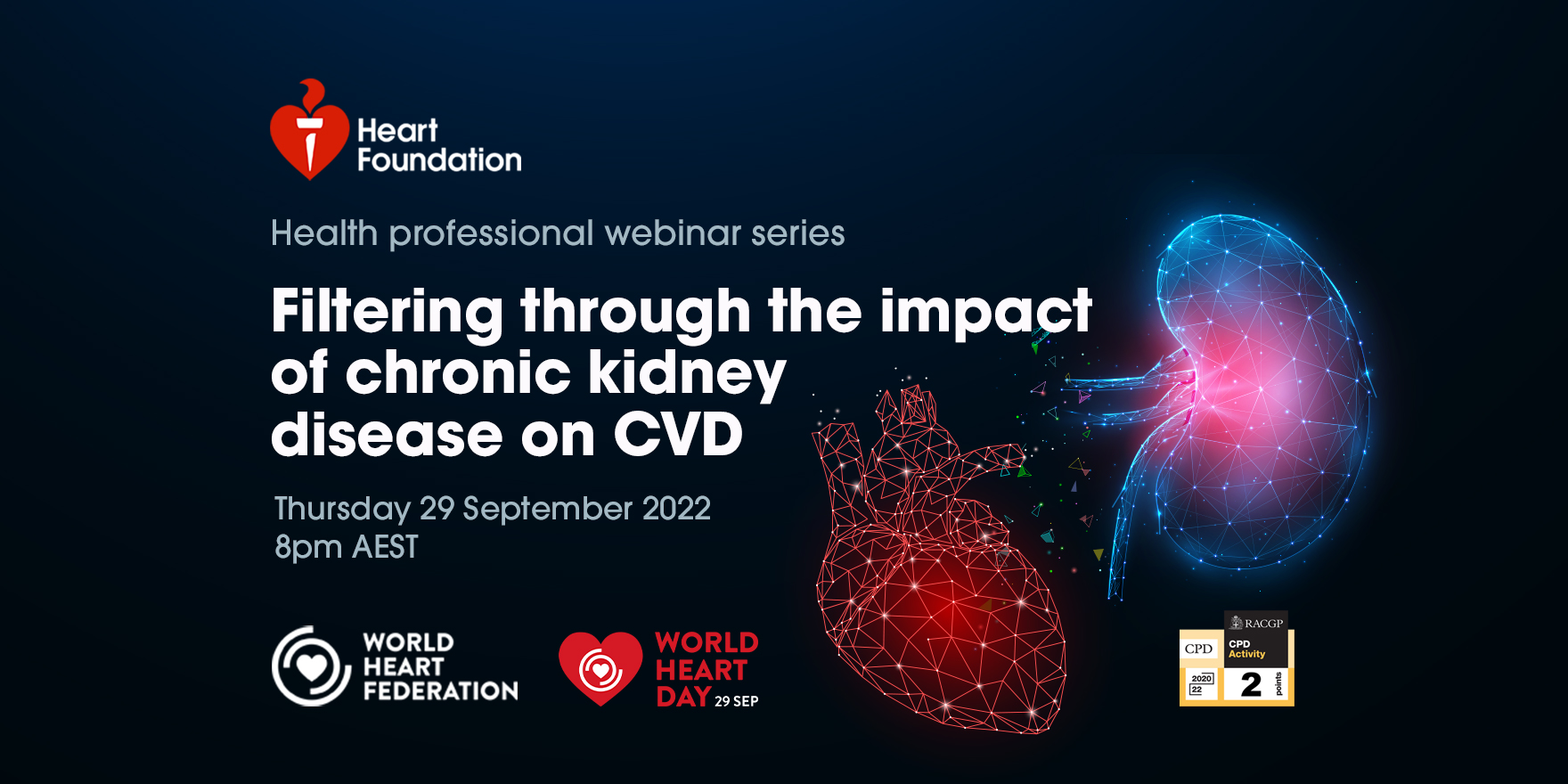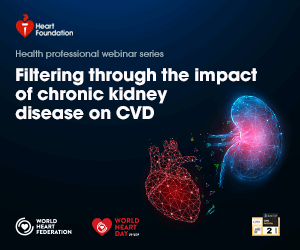This World Heart Day, tune in for the latest on early detection of renal risk factors for CVD.
Chronic kidney disease is associated with a higher risk of CVD. Early identification of renal risk factors is crucial for the timely assessment and management of CVD risk.
Cardiovascular disease (CVD) is the leading cause of morbidity and mortality in people living with chronic kidney disease (CKD). Even after adjusting for traditional risk factors, CKD is associated with an increased risk of all-cause and cardiovascular mortality.1 There is an independent inverse association between reduced estimated glomerular filtration rate (eGFR) and, albuminuria, and increased cardiovascular mortality.2,3
Comorbidities such as CVD and diabetes are common in people living with CKD, as are traditional cardiovascular risk factors such as dyslipidaemia and hypertension.3 For individuals with CKD, regular CVD risk assessment is critical. Formal risk assessment can be challenging in the setting of CKD given risk assessment equations may be less reliable, and risk is often underestimated.4 The burden of CKD is much higher in First Nations Peoples, who are twice as likely as non-Indigenous adults to have CKD and four times as likely to have advanced disease.3,5
Early intervention with lifestyle modification and appropriate pharmacotherapies is essential for managing CKD and its associated cardiovascular risk. Pharmacotherapies, such as ACE inhibitors, can reduce progression of CKD and cardiovascular risk by up to 50%.6 Overall, however, there is an unmet clinical need for effective CKD treatments. Dapagliflozin, an SGLT2 inhibitor, is the first new medicine to be added to the PBS in more than 20 years for the management of proteinuric CKD.7
This World Heart Day (29 September), the Heart Foundation is partnering with the World Heart Federation to bring you a clinical webinar that will explore the latest evidence on CVD and CKD. In 60 minutes, leading experts will unpack the role of early detection of renal risk factors for CVD, as well as pharmacological strategies for the prevention and management of the two conditions.
REGISTER NOW
Joining live from the US will be Professor George Bakris, a nephrologist and Certified Hypertension Specialist trained at the Mayo Clinic and the University of Chicago Medicine. He will provide an update on the optimal management of blood pressure and lipids in reducing progression of CVD and CKD. His research evaluates specific markers of kidney disease progression and increased CVD risk, as well as how changes in arteries affect the heart and kidneys.
There to discuss the early detection of renal risk factors as part of CVD risk assessment will be Professor Merlin Thomas, an internationally recognised clinician-scientist and leading expert in diabetic kidney disease.
Professor William Majoni, a Senior Staff Specialist in Nephrology and Internal Medicine and Director of Renal Services for Top End Health Service (NT), will then explore the association between CKD and CVD in First Nations Peoples.
Lastly, Dr Alison Edwards, a rural GP in Port Broughton (SA), will provide practical advice and commentary on the clinical application of the evidence. Dr Edwards has been Clinical Chair of the Australian Primary Care Collaborative, which focussed on CKD and CVD screening, prevention and management.
There will also be an opportunity to have your questions answered in an interactive Q&A with the expert panellists. So, save your spot now and tune in on World Heart Day for Filtering through the impact of chronic kidney disease on CVD.
“These webinars are as good as it gets. You’re doing a great job!”
– GP in WA, attendee of 2022 Heart Foundation clinical webinars
This webinar is accredited by the RACGP for 2 CPD points (activity no. 367709). Education provider: Scius Healthcare Solutions.
MEET THE EXPERTS

Professor George Bakris
Professor of Medicine, University of Chicago (USA)

Professor Merlin Thomas
Clinician Scientist & Program Leader,
Department of Diabetes, Monash University

Professor William Majoni
Senior Staff Specialist in Nephrology & Internal Medicine & Director of Renal Services, Top End Health Services, Royal Darwin Hospital

Dr Alison Edwards
GP, Broughton Clinic
References
1. Matsushita K, van der Velde M, B.C. Astor, M. Woodward, A.S. Leveley, P.E. dejong, et al. Association of estimated glomerular filtration rate and albuminuria with all-cause and cardiovascular mortality in general population cohorts: a collaborative meta-analysis. Lancet. 2010;375(9731):2073-81. doi:10.1016/S0140-6736(10)60674-5
2. Go AS, Chertow GM, Fan D, McCulloch CE, Hsu CY. Chronic kidney disease and the risks of death, cardiovascular events, and hospitalization. N Engl J Med. 2004;351(13):1296-305. doi:10.1056/NEJMoa041031
3. Australian Institute of Health and Welfare. Chronic kidney disease: Australian Facts. 2022.
4. Sarnak MJ, Amann K, Bangalore S, et al. Chronic Kidney Disease and Coronary Artery Disease: JACC State-of-the-Art Review. J Am Coll Cardiol. 2019;74(14):1823-1838. doi:10.1016/j.jacc.2019.08.1017
5. Chen T, Harris DC. Challenges of chronic kidney disease prevention. Med J Aust. 2015;203(5):209-10. doi:10.5694/mja15.00241
6. Kidney Health Australia. Chronic Kidney Disease (CKD) Management in Primary Care (4th edition). 2020. Accessed 5 Sep 2022 https://kidney.org.au/
7. NPS MedicineWise. Dapagliflozin for chronic kidney disease 2022. Accessed 5 Sep 2022. https://www.nps.org.au/radar/articles/dapagliflozin-for-chronic-kidney-disease




